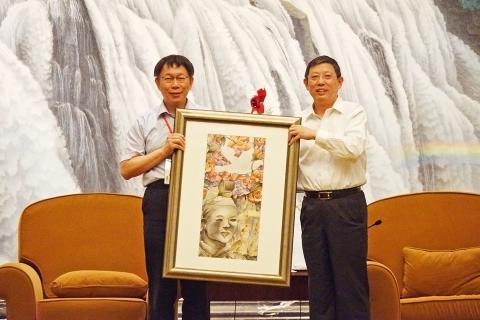Taipei Mayor Ko Wen-je (柯文哲) yesterday told Shanghai Mayor Yang Xiong (楊雄) that he hoped increased participation in this year’s Taipei-Shanghai forum would help both sides of the Taiwan Strait boost interactions, goodwill and mutual trust.
Ko, who arrived in Shanghai earlier yesterday for the Taipei-Shanghai City Forum, made the remarks during his meeting with Yang, where the two exchanged pleasantries and souvenirs.
The nearly 100 businesspeople in the 130-strong Taipei delegation are scheduled to exchange opinions about culture, smart city infrastructure, youth entrepreneurship and healthcare systems within communities with their Chinese counterparts today at the Ruijin Hotel Shanghai, the forum’s venue.

Photo: CNA
Yang touted Shanghai and Taipei as the first two cities to have carried out exchanges across the Taiwan Strait, including the annual forum, which he said has led to remarkable outcomes. In return, Ko expressed his gratitude to the Shanghai City Government for hosting the event.
Ko presented Yang with a souvenir, a painting by Taipei Municipal Bailing Senior High School student Hsu En-chi (許恩綺), which features a white pigeon and a Qin Dynasty terra-cotta soldier, juxtaposing the concepts of peace and war.
In return, Yang presented Ko with a painted ceramic dish.
Yang referred to Ko as “Mayor Ko of Taipei,” avoiding a concern among local media outlets that China would try to undermine Taiwan’s sovereignty by addressing Ko in an inappropriate manner.
In response to reporters’ questions prior to his departure, Ko said he would seek to establish mutual trust across the Taiwan Strait.
“Without mutual trust, both sides are always on guard against each other. This slows things down, resulting in low efficiency,” he said.
Ko also brushed aside criticism by Taipei City Councilor Wang Shih-chien (王世堅) of the Democratic Progressive Party, who said that members of the delegation were “Ko Dynasty nouveaux riches,” using Universal Eye Center president Lin Pi-jung (林丕容) as an example.
In response, Ko said that Lin was his sole appointment to the delegation.
On Sunday evening, Wang told the Chinese-language Liberty Times (the Taipei Times’ sister newspaper) that Ko was apparently taking Lin, his National Taiwan University classmate, on the trip so that Lin could “establish business ties” in China, similar to methods employed by the Chinese Nationalist Party (KMT).
He lambasted Ko’s move, saying that private-sector delegates selected by the Taipei City Government are “parvenus” of the “Ko Dynasty.”
Ko said that, with the exception of Lin, who also doubles as the chairman of online shopping outlet books.com.tw, all delegates were appointed by the conveners of four sub-forums scheduled to open in Shanghai today.
“The only exception is Lin Pi-jung, my college classmate. We are quite close. Considering that he has a business in Shanghai and that he knows his way around, I specifically put him on the delegation,” he said.

The US government has signed defense cooperation agreements with Japan and the Philippines to boost the deterrence capabilities of countries in the first island chain, a report by the National Security Bureau (NSB) showed. The main countries on the first island chain include the two nations and Taiwan. The bureau is to present the report at a meeting of the legislature’s Foreign Affairs and National Defense Committee tomorrow. The US military has deployed Typhon missile systems to Japan’s Yamaguchi Prefecture and Zambales province in the Philippines during their joint military exercises. It has also installed NMESIS anti-ship systems in Japan’s Okinawa

‘WIN-WIN’: The Philippines, and central and eastern European countries are important potential drone cooperation partners, Minister of Foreign Affairs Lin Chia-lung said Minister of Foreign Affairs Lin Chia-lung (林佳龍) in an interview published yesterday confirmed that there are joint ventures between Taiwan and Poland in the drone industry. Lin made the remark in an exclusive interview with the Chinese-language Liberty Times (the Taipei Times’ sister paper). The government-backed Taiwan Excellence Drone International Business Opportunities Alliance and the Polish Chamber of Unmanned Systems on Wednesday last week signed a memorandum of understanding in Poland to develop a “non-China” supply chain for drones and work together on key technologies. Asked if Taiwan prioritized Poland among central and eastern European countries in drone collaboration, Lin

NO CONFIDENCE MOTION? The premier said that being toppled by the legislature for defending the Constitution would be a democratic badge of honor for him Premier Cho Jung-tai (卓榮泰) yesterday announced that the Cabinet would not countersign the amendments to the local revenue-sharing law passed by the Legislative Yuan last month. Cho said the decision not to countersign the amendments to the Act Governing the Allocation of Government Revenues and Expenditures (財政收支劃分法) was made in accordance with the Constitution. “The decision aims to safeguard our Constitution,” he said. The Constitution stipulates the president shall, in accordance with law, promulgate laws and issue mandates with the countersignature of the head of the Executive Yuan, or with the countersignatures of both the head of the Executive Yuan and ministers or

CABINET APPROVAL: People seeking assisted reproduction must be assessed to determine whether they would be adequate parents, the planned changes say Proposed amendments to the Assisted Reproduction Act (人工生殖法) advanced yesterday by the Executive Yuan would grant married lesbian couples and single women access to legal assisted reproductive services. The proposed revisions are “based on the fundamental principle of respecting women’s reproductive autonomy,” Cabinet spokesperson Michelle Lee (李慧芝) quoted Vice Premier Cheng Li-chiun (鄭麗君), who presided over a Cabinet meeting earlier yesterday, as saying at the briefing. The draft amendment would be submitted to the legislature for review. The Ministry of Health and Welfare, which proposed the amendments, said that experts on children’s rights, gender equality, law and medicine attended cross-disciplinary meetings, adding that